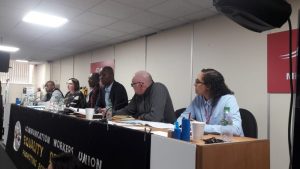Connecting our whole union – collectively fighting for justice
Equalities January 24 2019 “Connection and collectivism” will mark the union’s future approach to equalities, explained general secretary Dave Ward as he outlined today how the CWU will increase and strengthen our fight against racial discrimination and prejudice.
“Connection and collectivism” will mark the union’s future approach to equalities, explained general secretary Dave Ward as he outlined today how the CWU will increase and strengthen our fight against racial discrimination and prejudice.
Leading an innovative ‘Question Time’ discussion in the afternoon session of the Black Workers Conference in Birmingham, Dave and national officer Trish Lavelle – who has recently had equal opportunities added to her education and training duties – took questions from the audience on the new, mainstreaming strategy the union is moving towards.
Joining them on the panel were Ian Taylor (North West & North Wales divisional rep), Winston Richards (Greater London Branch officer) and Sharon Pratt (South West No7 Branch officer) – and the team were quizzed on multiculturalism in education, the challenge of increasing the involvement of black and minority ethnic (BAME) women, all-women shortlists and how to bring forward new reps and activists.
In answer to a question on how the new mainstreaming strategy will address issues such as the struggle against the far-right racists, our general secretary explained how moving from separate ‘equality-strand’ conferences to a whole day of motion-based equality debate, discussion and decision-making during annual general conference will make this “something we debate in front of the whole membership” and will “bring this debate into the workplace.”
The two words “connection and collectivism” summed up the new strategy, he said.
Trish highlighted the new “14 measures” – standards which the national leadership will be helping branches to achieve – as an example of how support for reps, and for equality activity, will be improved, while Ian said that he hoped that the changes would bring the union “closer to the workplaces” and would “increase the support for reps out there.”
Positive role models are key to greater involvement of BAME women, suggested Sharon, who explained that this meant “having people out there to look up to and identify with,” while Winston responded to a question about the possibility of all-women shortlists or all-BAME shortlists.
Earlier, delegates had approved eight unopposed policy resolutions, two of which – campaigning against the far right DLA/DFLA and fighting for compensation for the victims of the Windrush scandal – were chosen for submission to CWU General Conference in April.
The other six successful motions covered the welfare of individuals in immigration detention centres, the impact of the Mental Health Act on the BAME community, action against knife crime, opposition the the caste system, and support for a campaign to demand a formal apology from the UK government for the 1919 Amritsar massacre.
And in between the debates, conference also welcomed two guest speakers – Ismail Patel, from Friends of Al Aqsa, who spoke about the plight of the Palestinian people and Fazia Shaheen, from think tank CLASS, who outlined the growing economic inequality in the UK.
Midlands Region secretary Kate Hudson thanked the 95 and 31 observers from 70 CWU branches for coming to the conference and said that she was delighted to host this week’s national events.
By way of highlighting the continuing need to fight racism in all its forms, Kate played the disturbing YouTube footage of a recent attack on a young Syrian schoolboy refugee and stressed how important it is for people “not to just stand by, but to stand up and help.
“Now more than ever we need to speak our and we need to educate,” she said, and concluded: “Now recharge your batteries and keep on with what you all do best.”

